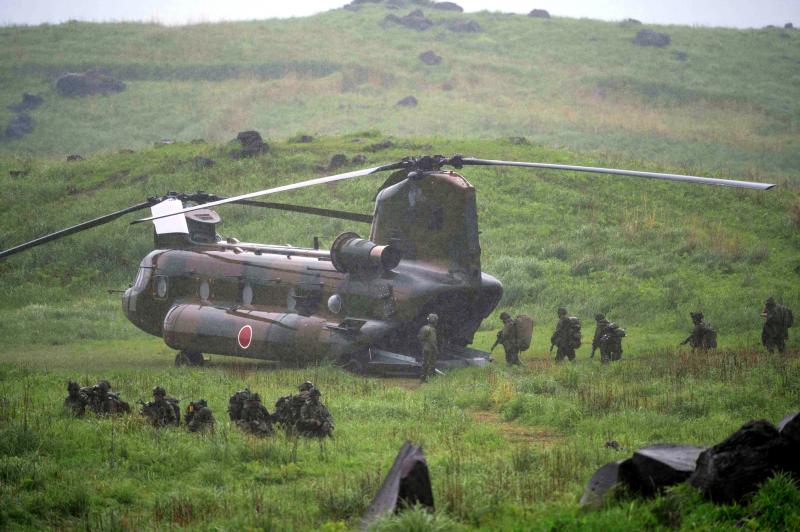Tokyo must boost its military at a “radically different pace” than in the past to counter Beijing’s growing capacity, Japan’s defense minister said in an interview published yesterday.
Japanese Minister of Defense Nobuo Kishi said that the gap between the Japanese military and the Chinese military was “growing by the year,” in an interview with the Nikkei daily.
“We must increase our defense capabilities at a radically different pace than in the past,” he said, citing China’s military spending as well as new areas of warfare such as space, cyber and electromagnetic warfare.

Photo: AFP
Japan’s defense spending has tended to hover at about one percent of GDP, but Kishi said that spending would be guided by needs rather than caps.
“The security environment surrounding Japan is changing rapidly with heightened uncertainty,” the Nikkei quoted him as saying. “We will properly allocate the funding we need to protect our nation.”
Japan’s post-war constitution limits the scope of its military to defensive power, and efforts to boost capacity have sometimes been controversial domestically.
Kishi’s comments come with Japan increasingly concerned about the regional security environment and particularly China’s growing assertiveness.
The military balance between Japan and China has “leaned heavily toward China in recent years, and the gap has been growing by the year,” he told the paper.
Kishi also said that Japan considers issues related to Taiwan “as our own problem,” as China increases pressure on Taipei.
Japan has been more vocal in the past few months about Chinese moves in regional waters, and particularly the presence of coastguard ships around disputed islands in the East China Sea.

A magnitude 5.6 earthquake struck off the coast of Yilan County at 12:37pm today, with clear shaking felt across much of northern Taiwan. There were no immediate reports of damage. The epicenter of the quake was 16.9km east-southeast of Yilan County Hall offshore at a depth of 66.8km, Central Weather Administration (CWA) data showed. The maximum intensity registered at a 4 in Yilan County’s Nanao Township (南澳) on Taiwan’s seven-tier scale. Other parts of Yilan, as well as certain areas of Hualien County, Taipei, New Taipei City, Taoyuan, Hsinchu County, Taichung and Miaoli County, recorded intensities of 3. Residents of Yilan County and Taipei received

Taiwan has secured another breakthrough in fruit exports, with jujubes, dragon fruit and lychees approved for shipment to the EU, the Ministry of Agriculture said yesterday. The Animal and Plant Health Inspection Agency on Thursday received formal notification of the approval from the EU, the ministry said, adding that the decision was expected to expand Taiwanese fruit producers’ access to high-end European markets. Taiwan exported 126 tonnes of lychees last year, valued at US$1.48 million, with Japan accounting for 102 tonnes. Other export destinations included New Zealand, Hong Kong, the US and Australia, ministry data showed. Jujube exports totaled 103 tonnes, valued at

TRUST: The KMT said it respected the US’ timing and considerations, and hoped it would continue to honor its commitments to helping Taiwan bolster its defenses and deterrence US President Donald Trump is delaying a multibillion-dollar arms sale to Taiwan to ensure his visit to Beijing is successful, a New York Times report said. The weapons sales package has stalled in the US Department of State, the report said, citing US officials it did not identify. The White House has told agencies not to push forward ahead of Trump’s meeting with Chinese President Xi Jinping (習近平), it said. The two last month held a phone call to discuss trade and geopolitical flashpoints ahead of the summit. Xi raised the Taiwan issue and urged the US to handle arms sales to

BIG SPENDERS: Foreign investors bought the most Taiwan equities since 2005, signaling confidence that an AI boom would continue to benefit chipmakers Taiwan Semiconductor Manufacturing Co’s (TSMC, 台積電) market capitalization swelled to US$2 trillion for the first time following a 4.25 percent rally in its American depositary receipts (ADR) overnight, putting the world’s biggest contract chipmaker sixth on the list of the world’s biggest companies by market capitalization, just behind Amazon.com Inc. The site CompaniesMarketcap.com ranked TSMC ahead of Saudi Aramco and Meta Platforms Inc. The Taiwanese company’s ADRs on Tuesday surged to US$385.75 on the New York Stock Exchange, as strong demand for artificial intelligence (AI) applications led to chip supply constraints and boost revenue growth to record-breaking levels. Each TSMC ADR represents